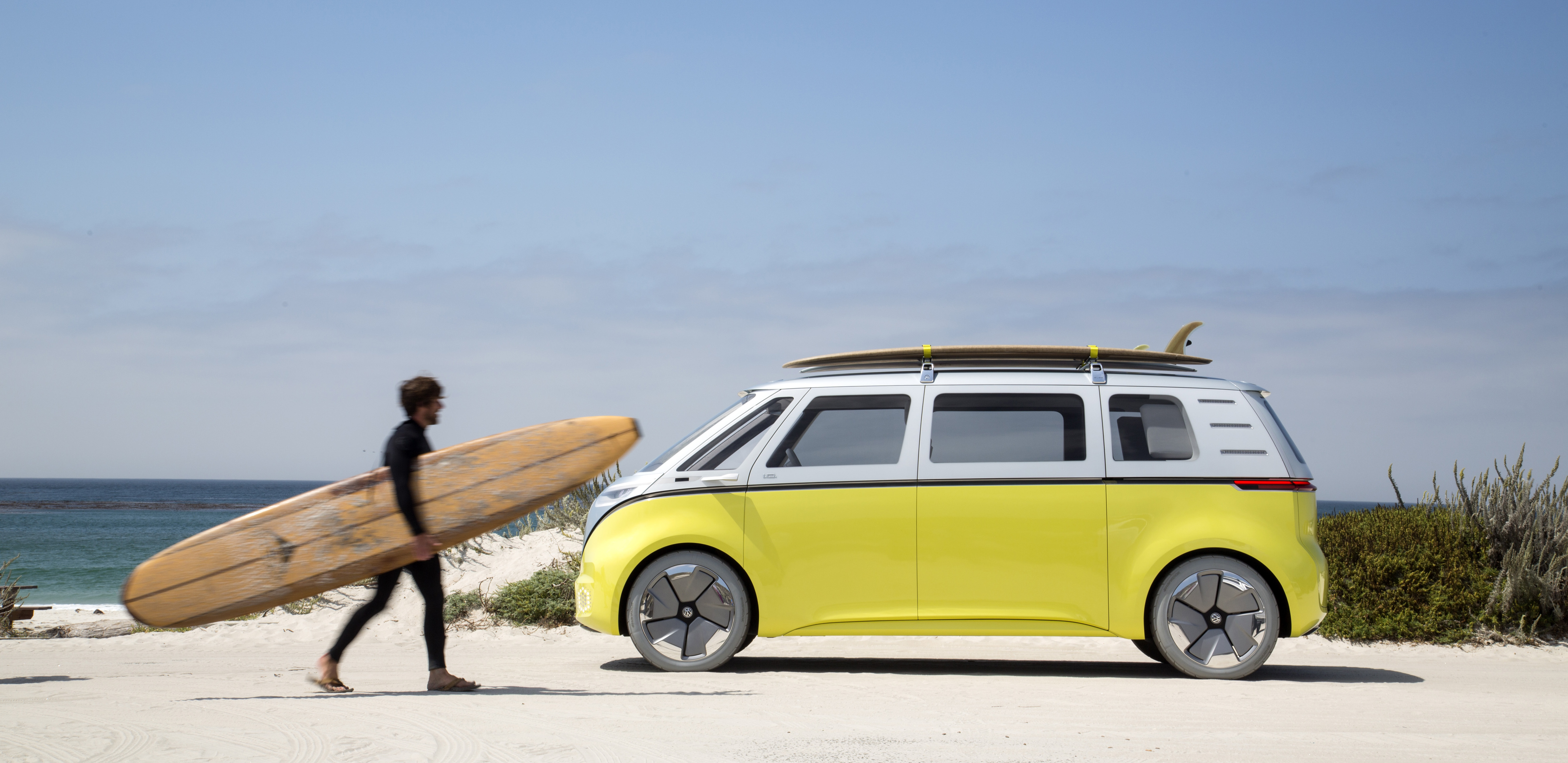
In the United States and around the world, transportation is advancing, from major technological innovations to major changes in infrastructure, but news coverage of the electrification of America’s automobiles has largely been limited to luxury electric cars. In this week’s news, some changes: VW proves electric microbuses aren’t just a public relations ploy, Audi goes solar, and DHL and Ford provide electric delivery vehicles. We’ll discuss all that, plus an after-action report on the solar eclipse, in this week’s post. Read on!
The VW microbus is back. Volkswagen announced that it would go ahead with production of a retro-cool EV version of its beloved microbus. Iconic for its snub-nose shape and association with hippie culture, the VW microbus was introduced in 1950 as its second model (Volkswagen Type 2) after the success of the Volkswagen Type 1, more commonly known as the Beetle. It enjoyed massive international popularity through the 1970s, played a major part in what became known as the Chicken War (not actually a war, just an international trade squabble over tariffs on chickens and light-duty trucks), but remained popular in Brazil right up to 2013, when it finally fell out of production.
For years now, VW has been promising an updated microbus for our 21st century lives. At the Consumer Electronics Show (CES) in 2016 the company showed off the BUDD-e concept car, which never quite made it to market, but did introduce an important and proprietary EV platform. This year, also at CES, the company premiered the I.D. Buzz, an EV that took clear design inspiration from the snub-nose Type 2 microbus.
Not quite coincidentally, just prior to its first announcement of an EV microbus, VW faced its largest scandal since WWII, even bigger than the Chicken War: DieselGate. Volkswagen was accused of deliberately obfuscating the emissions tests on the company’s “clean diesel” cars. The scandal brought on an identity crisis for clean diesel in general and Volkswagen in particular, as the company struggled to regain its equilibrium. At CES 2016, it unveiled the BUDD-e and sought to regain its place as a leader in advanced automotive technology.
After the company unveiled the I.D. Buzz in 2017, Verge published a piece called “Why Volkswagen keeps making microbus throwbacks it never intends to sell” with the subhead, “What emissions scandal?,” implying that VW was working to build back brand credibility and good feelings among consumers. The Verge piece did point out that the I.D. Buzz had something the BUDD-e didn’t: “an ability to make a direct appeal to two important demographic groups: nostalgic baby boomers who want to relive Woodstock and retro-obsessed millennials who are addicted to technology,” calling the microbus a brilliant marketing strategy that may not ever make it to market.
The marketing strategy seems to have worked, perhaps better than Volkswagen anticipated.
“After the presentations at the global motor shows in Detroit and Geneva, we received a large number of letters and emails from customers who said, ‘please build this car’,” Volkswagen brand chief Herbert Diess said in a statement. The company’s 38-second commercial says the future “is looking groovy.”
The I.D. Buzz is expected to be ready for market by 2022.
In other advanced vehicle news this week, delivery and logistics giant DHL and Ford Motors announced the production of a jointly made electric delivery van. Called the StreetScooter WORK XL, the vehicle includes a Ford Transit chassis and an all-electric drivetrain designed specifically for DHL, which plans to put 2,500 of the cars into service by the end of next year.
Meanwhile, The Independent reported that German automaker Audi is working with Chinese solar giant Hanergy to develop rooftop solar cells for cars. While you can’t power a car strictly from the sun just yet (unless it looks like this), the solar cells will be able to generate enough electricity from the sun to power the car’s AC system and other electrical functions. Expect a prototype by the end of the year.
Finally, last week we brought you news from grid operators everywhere, who agreed: gloomy predictions about the solar eclipse’s impact on the grid were overblown. Four days later, we’re pleased to say we told you so. Washington Post reports that in California, which relies more on solar than anywhere else in the country, things went off “without a hitch.”
“Things went really, really well,” said Eric Schmitt, vice president of operations at CAISO, in an interview with the Post. Like we said, grid operators are pretty good at keeping the lights on, even when the universe throws them a curve ball.
For more jokes about orbital mechanics and coverage of the next solar eclipse (plus all the advanced energy news that is due to happen between now and then), sign up for Advanced Energy Weekly below!
